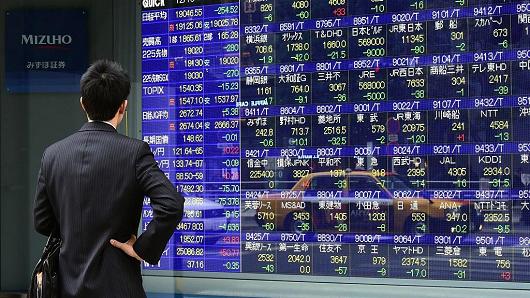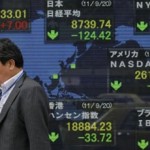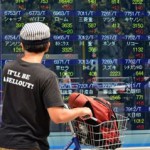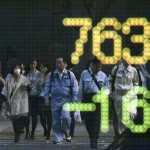Asia markets close mixed; Hong Kong shares tumble

Asian markets closed mixed on Thursday as investors digested remarks from Federal Reserve Chair Janet Yellen and oil remained volatile.
Hong Kong’s Hang Seng index, which resumed trading today after being shut from Monday through Wednesday for the Lunar New Year holiday, tumbled 4.25 percent to levels not seen since mid-2012.
In South Korea, the Kospi re-opened lower after its three-day holiday, and finished the session down 56.25 points, or 2.93 percent, at 1,861.54, with blue chip stocks such as Samsung Electronics and Posco closing down 2.92 and 2.49 percent, respectively.
Down Under, the S&P/ASX 200 see-sawed between positive and negative territory before finishing up 45.20 points, or 0.95 percent, at 4,821.10. The index closed Wednesday down 20.17 percent from its 52-week closing high, set in April 2015.
Shane Oliver, head of investment strategy and chief economist at AMP Capital, said in a note that “global growth worries could drive more short term weakness, [but] in the absence of a U.S./global recession it’s hard to see a deep and long bear market.”
Japanese shares got a respite from their sell-off; markets in Japan are closed for the National Foundation Day holiday.
The Nikkei 225 has been on a downward track in recent days, as the yen rapidly strengthened against the dollar. As of Wednesday’s close, the index had ended in the red for six of the past seven sessions, and was down 24.70 percent from its 52-week high set in June 2015.
Mainland Chinese markets and Taiwan will resume trade next week.
Financials mixed, Korea defense stocks soar
Australia’s so-called Big Four banks retraced losses to close up, with shares of ANZ gaining 1.29 percent, Westpac up 0.91 percent and NABup 0.74 percent. In recent days, banking stocks Down Under have come under pressure following the global volatility in the U.S. and European banking sectors. The Commonwealth Bank of Australiaerased gains of over 1 percent to finish up 0.13 percent.
In South Korea, banks and brokerages took a hit, with shares ofSamsung Securities falling 6.41 percent and Mirae Asset Securitiesdropping 5.96 percent.
On the flip side, South Korea’s defense stocks soared on the back of ongoing tensions in the Korean peninsula between the North and the South.
North Korea conducted a nuclear test on Jan 6. and has since defied warnings from the U.S. and the United Nations with plans to launch a space rocket, which it claimed was for a satellite program, but is widely considered to be a cover for developing ballistic missile technology.
Shares of Firstec closed up 7.45 percent, Speco gained 28.26 percent and Victek soared 29.93 percent.
Reports also said the South Korean government this week shut down operations in the Kaesong Industrial Complex, just north of the demilitarized zone where South Korean companies employ North Korean workers, as a result of escalating tensions with the North.
Shares of companies that operate in the complex fell, includingHyundai Merchant Marine, which was down by 19.57 percent, and IT and auto parts supplier Jaeyoung Solutec, which was down 23.92 percent.
Cochlear up by 14.1%
With earnings season continuing, shares of hearing aid maker Cochlearwent up 14.11 percent after the company reported half-yearly net profit was up by 32 percent at A$94 million ($67 million) for the six months to December 31. It beat analyst expectations and the company raised its full-year earnings forecast.
Shares of Suncorp retraced losses of as much as 1.03 percent to close flat. Earlier, the insurer and bank beat market earnings forecasts. Reports said Suncorp’s first-half net profit was A$530 million, more than the projected forecast of A$508 million by Macquarie.
Stock exchange operator Australian Securities Exchange (ASX) reported a net profit increase of 7.3 percent to A$213.1 million ($151.12 million) in the six months ending on December 31, while operating revenue for the same period was up 7.9 percent at A$376.2 million. Its interim dividend payout is set at A$0.991 a share, up by 7.4 percent on-year. ASX shares closed up 1.86 percent.
One of Australia’s largest miners, Rio Tinto, reported annual losses after market close and scrapped its progressive dividend policy, citing worsening global economic conditions and downturn in commodity prices. Rio Tinto reported a net loss of $866 million for 2015, compared with a $6.53 billion profit the previous year. Rio Tinto shares finished down 1.25 percent on Thursday.
Among other notable Australian companies reporting earnings today are Virgin Australia, Transurban and Mirvac.
Oil remains volatile
Oil prices remained volatile as overnight OPEC data pointed to a larger oil supply surplus on the world market this year, as the likes of Saudi Arabia pumped more to make up for reduced drilling by non-OPEC countries that have been hurt by lower prices.
In Asia hours, U.S. crude was down 1.57 percent at $27.02 a barrel after it dropped 1.75 percent in U.S. hours. Global benchmark Brent was down 0.32 percent at $30.74 after finishing up 1.72 percent overnight.
Energy plays in the region were mixed, with Oil Search losing 0.61 percent, Woodside retracing losses to close up 0.76 percent andSantos up by 2.35 percent. South Korean energy play S-Oil shed 8.57 percent.
Hong Kong-listed CNOOC, Petrochina and Sinopec sold off between 5.31 and 6.62 percent.
Overnight in the U.S.
Federal Reserve chair Janet Yellen began her semiannual congressional testimony in the U.S. overnight, where she addressed mounting whispers about whether the Fed could implement negative interest rates as a way to boost economic activity. She said the central bank has not completely researched whether that would be legal.
Asked if she foresaw the Fed cutting rates soon, having only hiked rates in December for the first time nine years, Yellen said she did not expect that to happen any time soon as she considered the risk of a U.S. recession to be low.
Kathy Lien, managing director of FX strategy at BK Asset Management, said in a Wednesday note that there were three key takeaways from Yellen’s testimony. First, the Fed hadn’t made up its mind about March, but chances are it won’t raise rates. Secondly, the central bank is also very worried about financial market volatility, a strong dollar, wider credit spreads, and low oil prices. But finally, it is optimistic about the labor market and the impact that wage gains will have on spending.
Morgan Stanley said in a note, though, that Yellen’s testimony wasn’t dovish enough to assuage growth and inflation concerns that are building in global markets.
“Until the Fed makes clear that ‘gradual’ could mean only one or two rate hikes in 2016 instead of three or four, or until the Fed changes the narrative away from rate hikes altogether, we think risk markets will struggle in the absence of positive catalysts,” Morgan Stanley analysts said.
Wall Street closed mixed as investors digested Yellen’s remarks. TheDow Jones industrial average closed down 99.64 points, or 0.62 percent, at 15,914.74. The S&P 500 closed 0.35 points down, or 0.02 percent, at 1,851.86, while the Nasdaq composite gained 14.83 points, or 0.35 percent, to 4,283.59.
Source: CNBC




























